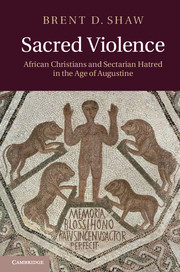Book contents
- Frontmatter
- Contents
- Abbreviations
- Maps
- Acknowledgments
- Introduction
- Chapter 1 This terrible custom
- Chapter 2 Church of the traitors
- Chapter 3 A poisonous brood of vipers
- Chapter 4 Archives of memory
- Chapter 5 The city of denial
- Chapter 6 Ravens feeding on death
- Chapter 7 Little foxes, evil women
- Chapter 8 Guardians of the people
- Chapter 9 In the house of discipline
- Chapter 10 Sing a new song
- Chapter 11 Kings of this world
- Chapter 12 We choose to stand
- Chapter 13 Athletes of death
- Chapter 14 Bad boys
- Chapter 15 Men of blood
- Chapter 16 Divine winds
- Chapter 17 So what?
- Appendix A Bishops and bishoprics in Africa: the numbers
- Appendix B Origins of the division: chronology
- Appendix C The Catholic conference of 348
- Appendix D The Edict of Unity and the Persecution of 347
- Appendix E The mission of Paul and Macarius
- Appendix F Historical fictions: interpreting the circumcellions
- Appendix G The archaeology of suicide
- Appendix H African sermons
- Bibliography
- Index
- References
Chapter 11 - Kings of this world
Published online by Cambridge University Press: 07 September 2011
- Frontmatter
- Contents
- Abbreviations
- Maps
- Acknowledgments
- Introduction
- Chapter 1 This terrible custom
- Chapter 2 Church of the traitors
- Chapter 3 A poisonous brood of vipers
- Chapter 4 Archives of memory
- Chapter 5 The city of denial
- Chapter 6 Ravens feeding on death
- Chapter 7 Little foxes, evil women
- Chapter 8 Guardians of the people
- Chapter 9 In the house of discipline
- Chapter 10 Sing a new song
- Chapter 11 Kings of this world
- Chapter 12 We choose to stand
- Chapter 13 Athletes of death
- Chapter 14 Bad boys
- Chapter 15 Men of blood
- Chapter 16 Divine winds
- Chapter 17 So what?
- Appendix A Bishops and bishoprics in Africa: the numbers
- Appendix B Origins of the division: chronology
- Appendix C The Catholic conference of 348
- Appendix D The Edict of Unity and the Persecution of 347
- Appendix E The mission of Paul and Macarius
- Appendix F Historical fictions: interpreting the circumcellions
- Appendix G The archaeology of suicide
- Appendix H African sermons
- Bibliography
- Index
- References
Summary
One of the few verbatim statements attributed to the bishop Donatus of Carthage, the founding father of the dissident church, was a verbal volley issued in the crisis of 347 – angry words spoken during a hostile confrontation he had with Paul and Macarius, emissaries of the emperor Constans. When they arrived in Carthage, Donatus demanded of them, Quid est imperatori cum ecclesia? – “What does the emperor have to do with the Church?” With this provocative rhetorical question, he was suggesting that the emperor was a secular official whose writ was to manage the earthly affairs of the Roman state and nothing else. For all his power, the emperor was not a bishop of the church and so ought to keep out of its affairs. Whether Donatus liked it or not, however, any reasonable answer to his question “What does the emperor have to do with the church?” would have to be an emphatic “almost everything.”
The state created, defined, and sustained the material, institutional, and ideological order of the secular world in which the bishop Donatus and the people of his church lived. Christian churches and the Roman state existed, as it has been well expressed, “in a permanent state of mutual dependence.” Even if Christian communities were closely integrated with and dependent on the state, however, this did not guarantee the government any easy or ready control of Christian behavior. Despite the fact that empire commanded immense, mostly unchallengeable resources of wealth, authority, and force, elements of both interest and pragmatic politics meant that the court's ability to manage ecclesiastical affairs at local level was limited. Despite these limitations, and whether the Catholics or the dissidents wanted it or not, the state was a constant player in their game. Both sides were therefore incessantly involved in a long-term game of trying to persuade the emperor and his officials to see things their way – to mobilize the state's considerable resources of property, law, and coercive power for their side. However hypocritical their objections might have been, what made the dissidents most angry was their conviction that the force of the state had been unjustly used by their opponents to compel them against their will.
- Type
- Chapter
- Information
- Sacred ViolenceAfrican Christians and Sectarian Hatred in the Age of Augustine, pp. 490 - 543Publisher: Cambridge University PressPrint publication year: 2011



